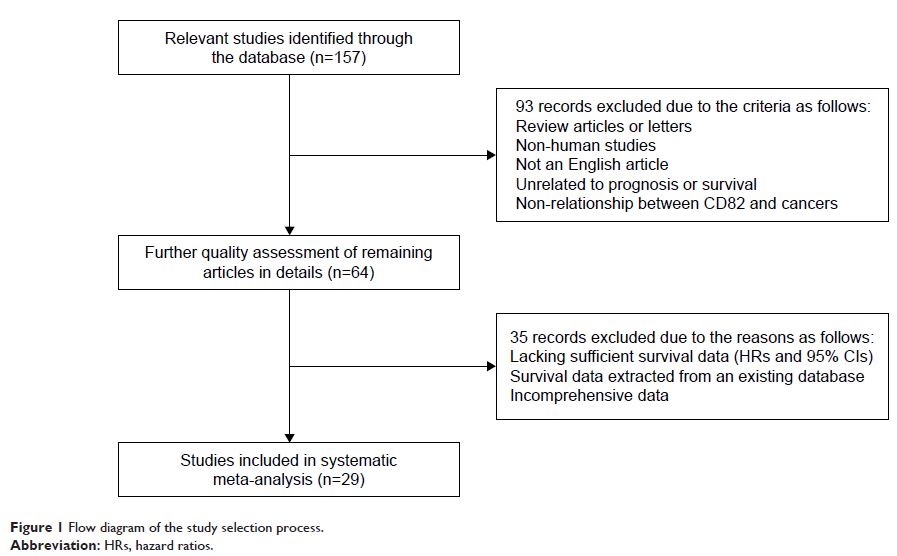108384
论文已发表
注册即可获取德孚的最新动态
IF 收录期刊
- 3.4 Breast Cancer (Dove Med Press)
- 3.2 Clin Epidemiol
- 2.6 Cancer Manag Res
- 2.9 Infect Drug Resist
- 3.7 Clin Interv Aging
- 5.1 Drug Des Dev Ther
- 3.1 Int J Chronic Obstr
- 6.6 Int J Nanomed
- 2.6 Int J Women's Health
- 2.9 Neuropsych Dis Treat
- 2.8 OncoTargets Ther
- 2.0 Patient Prefer Adher
- 2.2 Ther Clin Risk Manag
- 2.5 J Pain Res
- 3.0 Diabet Metab Synd Ob
- 3.2 Psychol Res Behav Ma
- 3.4 Nat Sci Sleep
- 1.8 Pharmgenomics Pers Med
- 2.0 Risk Manag Healthc Policy
- 4.1 J Inflamm Res
- 2.0 Int J Gen Med
- 3.4 J Hepatocell Carcinoma
- 3.0 J Asthma Allergy
- 2.2 Clin Cosmet Investig Dermatol
- 2.4 J Multidiscip Healthc

CD82/KAI1 在人类多种恶性肿瘤中的预后作用:31 项研究的荟萃分析
Authors Zhu J, Miao C, Liu S, Tian Y, Zhang C, Liang C, Xu A, Cao Q, Wang Z
Received 30 August 2017
Accepted for publication 6 October 2017
Published 6 December 2017 Volume 2017:10 Pages 5805—5816
DOI https://doi.org/10.2147/OTT.S150349
Checked for plagiarism Yes
Review by Single-blind
Peer reviewers approved by Dr Akshita Wason
Peer reviewer comments 2
Editor who approved publication: Dr XuYu Yang
Abstract: Tetraspanin CD82, also known
as KAI1, was revealed as an attractive prognostic tumor biomarker in recent
studies. However, some results of these studies remained debatable and
inconclusive. Therefore, we conducted a meta-analysis to clarify the precise
predictive value of CD82 in various neoplasms. Qualified studies were
identified up to April 27, 2017, by searching PubMed, EMBASE, and the Web of
Science. In total, 29 eligible studies were ultimately enrolled in this
meta-analysis. Pooled hazard ratios (HRs) with 95% CIs of overall survival and
disease/recurrence/progression-free survival were calculated to evaluate the
correct prognostic role of CD82. Statistical analysis demonstrated that high
expression of CD82 was significantly associated with enhanced overall survival
(HR =0.56, 95% CI: 0.47–0.67) and disease/recurrence/progression-free
survival (HR =0.42, 95% CI: 0.30–0.59) in cancer patients. Furthermore, we
also conducted the subgroup analysis and the results revealed that CD82 was
associated with favorable outcomes in cancer patients. Taken together, CD82
could be a promising biomarker for predicting the prognosis of patients with
malignant neoplasms, and the biological functions of CD82 are of great research
value of the subject.
Keywords: CD82, KAI1,
prognosis, meta-analysis
